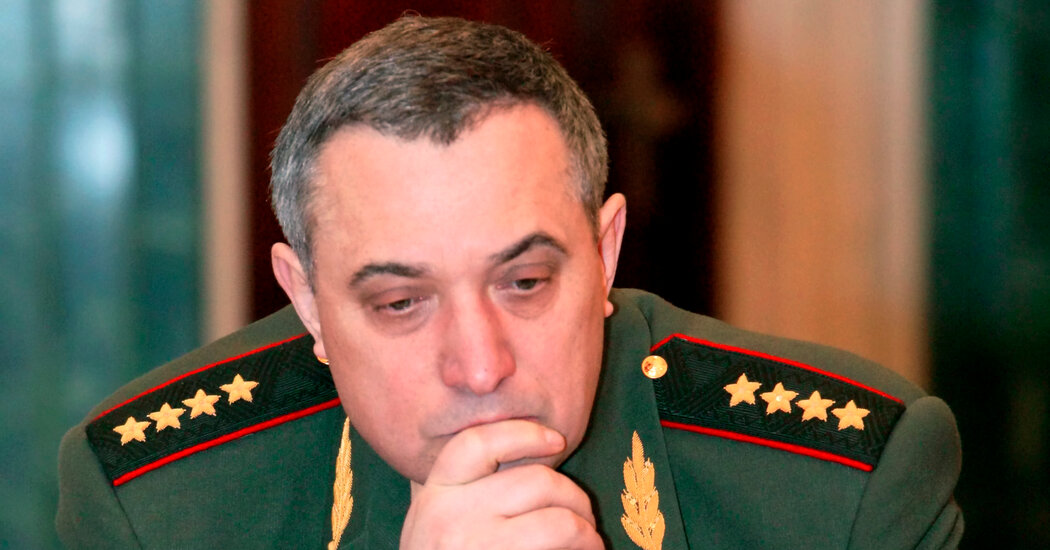His brutal campaign in Chechnya left a legacy of embittered civilians and vengeful leaders. But he was also part of a warming toward the West after the Soviet Union fell.
Gen. Anatoly Kvashnin, the chief of Russia’s general staff from 1997 to 2004, who led a brutal crackdown on separatists in Chechnya but who also took part in an early post-Soviet thaw with the West, died on Jan. 7 in Moscow. He was 75.
His death was announced by President Vladimir V. Putin. The cause was Covid-19, according to the Russian news agency TASS, quoting Nikolai Deryabin, the chief of staff of the Club of the Military Commanders of the Russian Federation.
General Kvashnin rose to prominence with the 1995 invasion of Chechnya’s capital, Grozny, Russia’s first major military action following the disintegration of the Soviet Union in 1991. The campaign portended Russia’s use of military force in later conflicts within the former Soviet borders, including in Georgia and Ukraine.
As a brash senior commander who would crow to the press about his intent to “liquidate” rebels, General Kvashnin commanded a harsh campaign in Chechnya, which was part of the Russian Federation. Tanks and bombs reduced Grozny to rubble, yet despite its superior military might, Russia found itself embroiled in some of the most horrific urban fighting since World War II.
Thousands of Russian soldiers were taken hostage, tortured and killed, appalling and haunting the citizens of a fallen superpower that was trying to enter a new era under Boris N. Yeltsin, the first democratically elected post-Soviet leader.
Pavel Felgenhauer, an independent Russian military analyst, told The New York Times at the end of General Kvashnin’s tenure, in 2004, that his leadership had “killed more Russian soldiers than any Chechen warlord ever did” and made him “the most hated general in the Russian military.”
The first Chechen war ended in 1996 in stalemate, which later provided an opening for Mr. Yeltsin’s successor, Mr. Putin, who promised to establish order and avenge a national failure.
General Kvashnin helped him achieve that goal by overseeing the initial phase of a second Chechen war, which began in 1999 and concluded about a decade later with Russia stabilizing the rule of a friendly local government.
General Kvashnin seemingly made attempts to leave the Cold War behind. In 2001, he spoke in favor of dismantling Russia’s largest electronic eavesdropping base in the West, at Lourdes, Cuba.
Early in his time running Russia’s general staff, he led a delegation to the Pentagon for lengthy talks focused on advancing a military partnership. The visit inspired optimism within the U.S. Joint Chiefs of Staff, Joshua Spero, who at the time was a strategic planning official in a Joint Chief’s division specializing in Europe and NATO, said in an email.
Those hopes dimmed in 1999, when Russian troops took control of an important airport outside Kosovo’s capital, Pristina, around the same time that NATO troops entered that Serbian province in an effort to quell violence between members of the ethnic Albanian majority and the Serb minority, which was backed by Russia.
The NATO supreme commander, Gen. Wesley Clark, was blocked from pre-empting the Russian move by a British subordinate, Michael Jackson, who told him, “It’s not worth starting World War III,” according to Senate testimony by Henry H. Shelton, then the chairman of the Joint Chiefs.
On Russian state television last year, Mr. Putin said it was General Kvashnin who had proposed the Kosovo mission. Mr. Putin added that he, as head of Russia’s security council at the time, had personally approved it.
“That was a pivotal moment for Europe and for our forces in Europe,” Peter Zwack, a former Army brigadier general who served as the senior American defense official in Moscow from 2012 to 2014, said in a phone interview. “Things were trending downwardly.”
Anatoly Vasilyevich Kvashnin was born on Aug. 15, 1946, in Ufa, a provincial capital in Russia that was then part of the Soviet Union. His father, Vasily Iosifovich Kvashnin, was a peasant who joined the military during the Great Patriotic War, as Russians call the fighting on the Eastern Front during World War II. He reached the rank of colonel. Anatoly’s mother, Lyubov Petrovna Kvashnina, was a homemaker who worked in kindergartens wherever her husband served.
Frequently moving with his military family, Anatoly grew up across the Soviet Union. He graduated from the Kurgan Machine-Building Institute in 1969 with a degree in automobile engineering and quickly became the head of a tank manufacturer in Dushanbe, Tajikistan.
He joined the army in 1971. Several years later, he began to move up the ranks of a tank regiment in Czechoslovakia. He joined Russia’s general military staff after the fall of the Soviet Union. On leaving his high post in 2004, he took on more minor government roles. His survivors include two sons, Aleksandr and Sergei.
Ivan Nechepurenko contributed reporting.































